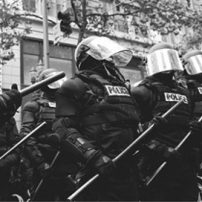
Police violence against prisoners … “hurts” the ECHR
JUDGMENT
Olisov and others v. Russia 2-05-2017 (no. 10825/09, 12412/14, and 35192/14)
SUMMARY
Police violence in pre-trial procedures. Torture. Research. Police violence with bumps, kicks, beatings with a wooden trunk, choking attempts, bindings etc. against detainees to confess consists of torture. Insufficient investigation by the Russian authorities, which justified the acts by the police officers who committed them and who claimed the arrestees were responsible. However, the ECtHR did not believe the police and condemned Russia for torturing the applicants. Infringement of Article 3 of the ECHR in both substantive and procedural terms (lack of adequate research).
PROVISION
Article 3
PRINCIPAL FACTS
The applicants are Aleksandr Olisov (born 1973), Nikita Danishkin (born 1985) and Yuriy Zontov (born 1981). They live in Orsk in the Orenburg region, Krasnoturinsk in the Sverdlovsk region and Orenburg, respectively (all Russia).
The applicants relied on Article 3 (prohibition of torture) to complain that they had been subjected to violence from police officers with the aim of obtaining confessions and that the authorities had refused to investigate their allegations. Their complaints include claims that they had been punched and kicked, beaten with a truncheon, suffocated, tied up in torturous positions, lifted and dropped.
THE DECISION OF THE COURT
Article 3 (prohibition of torture)
The Court held that, in all of the cases, the applicants had been taken into police custody for a substantial period of time, without any arrest being recorded, but clearly in circumstances where they were being detained and interviewed by the police on suspicion of a criminal offence. The applicants later claimed that they had been subjected to violence. In subsequent medical examinations, injuries had been recorded which could have resulted from the acts of alleged ill-treatment by the police.
These factors were sufficient to make the applicants’ allegations credible and to give rise to a presumption in favour of their account of events. The failure to record the arrests weighed in favour of the applicants’ version of events and made the presumption in favour of them stronger. In the circumstances, the burden of proof had been on the Government to provide a satisfactory and convincing explanation, by producing evidence which cast doubt on the applicants’ allegations.
In all of the cases the authorities had refused to instigate criminal proceedings against the officers and the refusals had been upheld by the domestic courts. The authorities found in favour of the explanations given by the police, that the injuries had been the result of the applicants’ self-harm or their resisting arrest. These conclusions had been problematic for a variety of reasons. For example, the authorities had given decisive weight to the evidence of the officers who had themselves been accused of the ill-treatment: despite the fact that their explanations had been unconvincing and/or uncorroborated by other evidence. Due to the lack of a criminal investigation, the steps taken by the authorities to examine the applicants’ allegations had been limited to those of a pre-investigation inquiry. However, as the Court found earlier in the case of Lyapin v. Russia, no. 46956/09, §§ 129 and 132-36, 24 July 2014, a pre-investigation inquiry under Russian procedure is not sufficient to comply with the requirements of the Convention for the investigation of credible allegations of police violence. A proper criminal investigation is required, with all of the substantive investigative steps that this entails.
The Government had supported the authorities’ explanations about the origin of the applicants’ injuries. However, these explanations had not been satisfactory or convincing, and had been put forward as a result of an inquiry falling short of the requirements of Article 3. The Government had therefore failed to discharge its burden of proof to produce evidence casting doubt on the applicants’ version of events. The Court therefore held them to be established. It found that the acts of violence to which the applicants were subjected during the police interviews, given their severity and the aim of obtaining confessions, amounted to torture. There had accordingly been a violation of Article 3 under both its substantive and procedural limbs.
Just satisfaction (Article 41)
The Court held that Russia was to pay the applicants a total of 95,000 euros (EUR) in respect of non-pecuniary damage and a total of EUR 3,259 in respect of costs and expenses.


